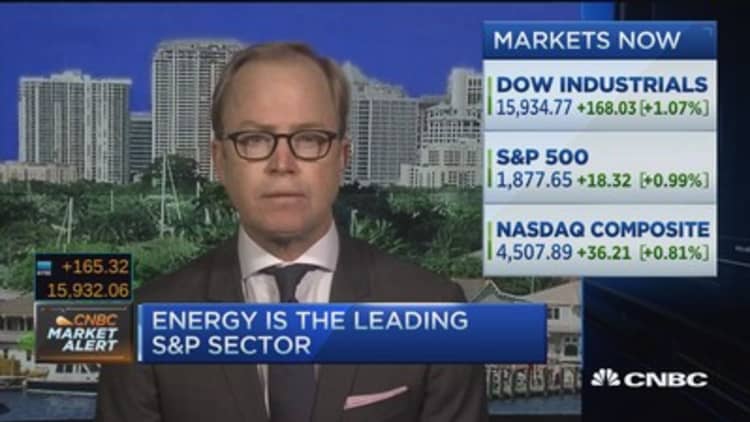


Central bank policy was top of mind on Wall Street on Thursday, but experts were divided in deciphering the path forward.
Less than a week before the next Federal Reserve meeting, the European Central Bank outlined an unusually pointed plan for weakening the euro. With other central banks loosening money supplies amid vacillating U.S. equity markets, the Fed is now faced with interpreting the health of U.S. economy — and matching interest rates accordingly.
Would signals of a potential recession cool the Fed's tightening? Or are equities simply uncoupled from an otherwise healthy U.S. economy — one that can withstand higher interest rates? Further, does a Fed move matter either way to the markets, with larger-scale tensions in commodity markets, in China and the Middle East?
Read MoreThree incredible facts about the market's horrible run
'Extreme market fear'
Richard Farr, chief market strategist for Merion Capital Group, said Thursday the U.S. economy is "moving very slowly toward recession." Farr sees a connection between central banks and equity markets, saying that while cheap money from low interest rates might spur investing, it might also push stock prices up too far.
"You've got to be willing to take out a loan. You've got to be willing to invest," Farr said on CNBC's "Squawk on the Street". "If that's not the case, you've got a problem. But here's the thing: If interest rates are negative, ultimately, the more negative you go ... the more negative the terminal value is on your investments. So the goal is to push stock prices up at all costs. And so far, at least in the last few months, it's not been working out."
Jurrien Timmer, director of global macro at Fidelity Investments, also sees central bank policy — in particular, the tug of war between the Federal Reserve and the People's Bank of China — as pivotal to the stock market's recent volatility. But he said the U.S. economy remains in pretty good shape.
"We're in a midcycle expansion heading towards late cycle," Timmer said.
The Fed's move last month to raise interest rates might also have a role in the market's recent sensitivity to commodity prices, said Jodie Gunzberg, global head of commodities at S&P Dow Jones Indices.
"Fundamentally, this is the worst we've ever seen in history for oil," Gunzberg said. "It's the combination of the supply war in the '80s and the global financial crisis — demand crisis — happening at the same time, with a strong dollar. And the rising interest rates set off extreme market fear which spiked the correlation four times higher than it was before the interest rate rise. So investors are just getting out of risky assets."
Read More Why 2:30 starts the most important hour of the day
'Like pushing on a string'
Wells Fargo senior global equity strategist Scott Wren said he feels growth is going to be modest but pretty dependable in the U.S. The global growth story is "a little more dicey," Wren said, but may be a bit better out of Europe, Japan and China.
He questioned the potency of recent central bank policies, saying they have been like "pushing on a string."
"You just can't generate any growth in the wake of a gigantic credit bubble. This is what happens," Wren said. "Rates can be on the floor. ... This is a five-, 10-year deal until we get out of this. Probably through the next recession, whenever that is. So yeah, central bank action right now has not been effective."
While central banks are quite powerful, they're not the only game in town, said Randall Kroszner, a former member of the Board of Governors of the Federal Reserve System. Stocks may be reacting to policy uncertainty from elsewhere, Kroszner told CNBC, such as the Chinese economy, tensions in the Middle East, and oil supplies.
Still, Kroszner said he expects quite "gentle" policy from the Federal Reserve, with more than two interest rate hikes this year. At their meeting in December Fed policymakers suggested they may opt for four in 2016.
"I'm not quite sure the global economy has fallen apart yet," Kroszner said. "We still have to get some more data."




